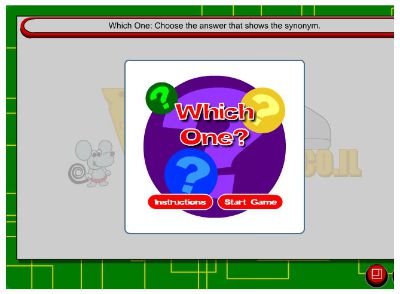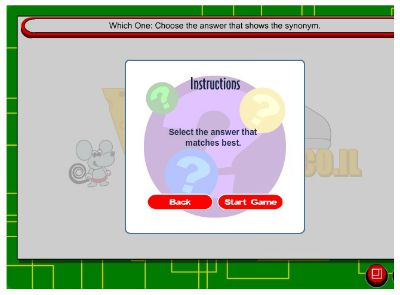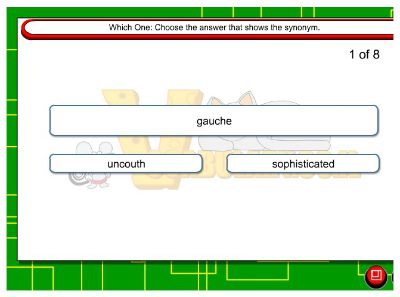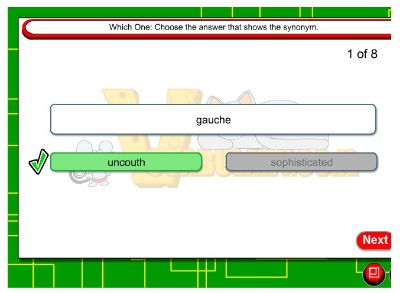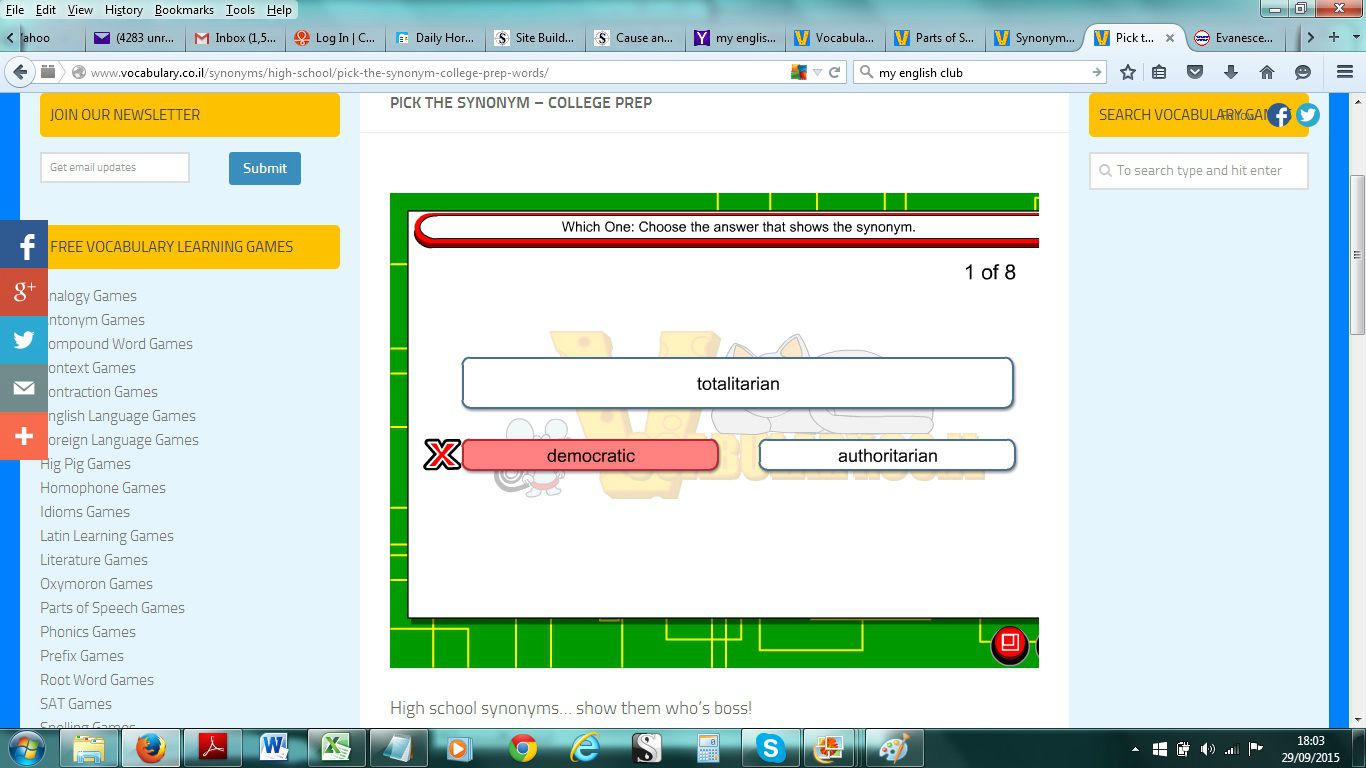| Back to Back Issues Page |
 |
|
Issue #072 -- Week 20/09/15-26/09/15 September 29, 2015 |
Hello,Greetings and General InformationA warm welcome to our new subscribers! I wish you will find My English Club fun and instructive and I look forward to welcome you as a new valued member soon. Read, learn and communicate around the world! Please feel free to contribute to these pages when you have a minute. They are meant to be a platform for exchanging ideas, stories and opinions - an ideal medium for practicing your English, which should be used to the full. Together, let's bring it alive, let's make it the welcoming community you wished for, when you joined. Use the Comments facility at the end of every page and start making friends worldwide. You and your friends can always subscribe individually through the form on My English Club If anybody mentions to you that they are interested in receiving it, please tell them this, with thanks. Also, they can read the previous issues on Back Issues for English Corner E-zine. Of course, you can also unsubscribe at any point, by using the link at the end of any issue of the e-zine, should you wish. We started studying three subjects back in September 2014: pronunciation and grammar for improving your communication skills, as well as website design and development, for those advanced students of ours who would like to apply their English to building a business online. In addition, we had the course in reading, which we finished in March 2015. Following some requests at that time, we started a section on educational games, to add the fun into your learning. As we finally finished the course in website design in the last week of August, we have replaced it with our new course in writing, which I hope will appeal to everybody, from beginners to advanced speakers of English, more precisely to those who want to master the skill of writing in English. Until I'll have the time to write my e-books from these courses, you can enjoy our past lessons for free, as follows: Pronunciation Lessons Reading Lessons Grammar Lessons Website Design Lessons Weekly Games Grammar ~ Intensifying Adverbs and ModifiersWe shall jump to a totally different matter today: we'll consider the adverbs that express your heightened emotion in speech is by using intensifying adverbs and modifiers. These are those ‘degree adverbs’ that help intensify the meaning of another word. You can find this lesson on the Intensifying Modifiers page. I do hope you find this useful and by next time I shall prepare some exercises for you to practice this matter. Writing ~ Essential Requirements for WritingLet's see what does one need in order to write. The need to write One can have everything and even more than it is necessary to write, but if one does not have a deep desire to express oneself, not enough will come out of one’s mind and onto the paper for it to be called writing. To begin to write, one must begin to write – as simple as that. Academic qualifications are not necessary, nor having anybody else’s material. However, you will need vocabulary and your own way about your words, to make it your own style. You will also need some basic equipment, time and space, as explained below. Equipment Some of the best love letters (including published ones), poems and short stories were written in pencil or ink on paper and the truth is that’s the most basic starting point. Shakespeare only had that and he did quite well for himself. However, nowadays, if you want anybody else to read and assess your writing, it is advisable to have a word processor, either on a computer, laptop or a tablet, together with a printer. If you wish for an editor to view your piece objectively, do not offer it as a handwritten manuscript. Apart from this, you will need a dictionary. Any typewriter/computer would do, but only the best dictionary you can lay your hands on would do you any justice. This is like the seeds for a gardener – it carries your end product in material ready to germinate: words. Apart from a good dictionary, you can become quite dexterous in using thesauruses, rhyming dictionaries, word-finders – anything that can help by inspiring you, but these are not actually essential. In fact, if you are using them to reduce your own labour, they are actually counter-productive. The advice here is for you to use your words, not other people’s. Time requirements Have you ever had this thought in mind, that you want to write so much, but you just cannot find or make the time? Yep! On the other hand, any writer will insist that regular practice, even if it is for minutes, or for a couple of lines, but daily is more valuable than any long time occasionally. The secret is that the more regularly one sits down to write, the more readily words present themselves. To take this idea even further, try to make the regular aspect not just the one related to the day (every day), but also try to settle for writing at the same time every day, if you can. After a short while, your mind will even miss it, if you’re not ready sometimes – try it and see for yourself. The best advice to a beginner is to write every day. It doesn’t much matter what and how well, but what matters is to keep the ‘machine’ lubricated by regular use. If a project is on the go (you’re writing a novel or a short story, for example) and you’re stuck, the best approach is to keep writing, even if you only fill in your journal or start writing down your fantasies. If you do get to the stage where you write regularly, you will be amazed how soon the mind will get used to the exercise and will generate your good material. Claim your time for writing, against anything else that other people think is more important, be realistic about it and soon you’ll realise how the world around you will also adapt to your needs and will come to respect your writing time. Space If you don’t have your own writing room, or a hut, or an attic, then try to claim a part of a room and dedicate it for writing, even if it is a particular chair. Every time you use it, that place will become associated with work and your mind will know what’s expected of it and will settle to work with ease once you sit there. Methods of work There is no generalization about this aspect – there are as many working styles as writers. During this course, we will suggest some useful exercises. However, only you can find how you work best and what methods you need to use. You can have the best equipment in the world, and great ideas, but if you don’t know how to make the best of it all, you’re still on a quest to discover yourself and the way you work best and that is actually the tipping point. Without any further ado, I suggest that you take the plunge and get a journal and a commonplace book going. The difference is this: in your journal, you will record your life and vital experiences. Writing in a journal should be spontaneous and innocent – your chronicled experiences should be near to your heart. This is exactly what will help you to find your voice. The commonplace book on the other hand will include any phrase or expression that captivated you at any time, anything that has moved you or impressed your mind or heart. Use this as a scrap book over the years and this is why it is more practical if you date your entries, because you will find that this will be an extraordinary record of your imaginative development. Another useful aspect of the commonplace book is that by writing down words and expressions one can ‘feel’ the meaning and the rhythm of the words more readily than by just reading them. One can get used to the drama of syntax and learn the craft of writing in a shorter time. So now… go ahead and start yours. You should remember that you can actually send your stories in by using this form and I shall offer to comment on them, if you wish. For those of you who only want to learn to write in order to pass your exams, keep on reading (and writing, of course), because we shall have some lessons for you later on, in preparation for your TOEFL exam, as we did for our LINK: reading lessons. Game of the Week ~ Pick the SynonymThis is a very simple game to explain, but it's not as simple to play as you think, because you need to know your vocabulary and lots of synonyms to play it. But you can practise it from now on - it's the Pick the Synonym game. You are not timed for this and you have 8 turns in one game.
You do get the instructions, but only simply put. You don't need more...
From here onward, you're on your own, picking the right synonym.
Once you've chosen, you get the answer, with a sound celebrating your right choice:
... or pointing out your failure:
And... this is it, my friends! Go ahead and play the Pick the Synonym game in your own time. Enjoy! This is it for now, my friends!I hope you find this information useful and not too confusing. Even though you're at the stage of building on it, have patience at this point in your learning and you'll be able to reap the fruit of your work later on, whichever aspect of our lessons you are concentrating on. Please feel free to comment and suggest your ideas by replying to this email - I look forward to hearing from you. If you wish to chat either with me or with other members worldwide, go to My English Club . All the best from me until next time, Lucia da Vinci Founder of My English Club |
| Back to Back Issues Page |
